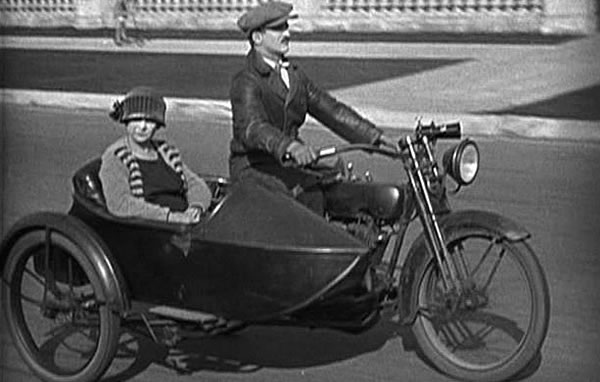We are lunching at Josephina, right across from Lincoln Center, and for some reason I am babbling excitedly to my grandmother about the motorcycle I’d bought recently. I hadn’t even told my parents, and as I spoke I worried a bit belatedly that she might say something to them. But her warm attention told me I did not need to be concerned. She leaned into the table. “You know,” she said, glancing quickly at the people next to us, “I rode on a motorcycle once!”
I Wasn’t Interested
I’ll admit straight up, I wasn’t that interested in spending time with my Hungarian grandmother. I was in my late twenties. When I came into New York City occasionally from a job in central Connecticut, I wanted to see friends and have fun, not perform duties. My father noodged me to phone her. I tried to ignore him. Then one particularly quiet evening, I picked up the phone and dialed. Just one call, I told myself, there won’t be anything more to it.
Over the next few years, we went to museums, movies, the opera, always with lunch just before or after. Initially, she was kind of a stranger, soon she became interesting, then she was my friend. I shared troubles and life decisions. She told me about her classes and trips. I learned about her younger days and family stories I never knew.
One time we lunched before we went to see the film, The Piano. I don’t necessarily recommend taking your grandmother to see The Piano, by the way. Not unless she is likely to fall asleep at the racier parts. Fortunately, my grandmother dozed through most of them. In any case, as she sat down at the table she pulled out a notebook. “I have a class at the Hunter College, it is about Chinese history, so interesting,” and she began to tell me about Emperor Qin, and how when he died he was buried with 8,000 terra-cotta soldiers. “He wanted to take an army with him to conquer heaven!” She swayed side to side as she slapped her cheek in disbelief. “Jaj, istenem!” (That would translate to something along the lines of “Oh my goodness!”) I resisted her boundless enthusiasm at first, but gradually, I surrendered to her sense of wonder.
A Question I Hadn’t Known I’d Longed To Ask
Another time we found ourselves sitting on a bench in Central Park, after a visit to MoMA. A film about World War II partisans brought the subject of the war to our conversation for the first time. And finally, I put long-hidden puzzle pieces together, and asked her a question I hadn’t known I’d longed to ask until that moment.
“How many people did you know were lost in the camps?” I said, referring to the Nazi death camps to which Hungarian Jews were sent late in World War II.
She was quiet for a while. My heart pounded.
“About sixty friends and family,” she said, staring straight ahead.
“How many were family?”
“Maybe thirty,” she said, adding, “They lived in the countryside,” in a tone that suggested this explained things.
“Who were they? Can you tell me about any of them?” I asked, filling with anguish.
She did not answer. Her face was pale, her eyes shifting, unfocused.
“My cousins Simon and István, that is Steven. He was a decorated officer in the army in World War I,” she said, her face turning hard and gray. “They didn’t care. The Nazis came and they took him away. Him and his wife and their children. And his mother, too.”
On the soccer field, a boy kicked a ball just past the opposing goalie’s outstretched arms and everyone on both sides shrieked. My mind was on fire. How could she say “sixty friends and family” so matter-of-factly? And to have said nothing to me until now? I started to think of more questions, but she spoke first.
“I have not been to Central Park in nearly thirty years,” she said. “Thank you, dear Peter.” She tapped me on the thigh as she smiled. “I will tell all my girlfriends that I have been to the Central Park.” She gathered her things and stood up. “They will never believe it.”
No Asking Without Relating
Thinking back on the moments with my grandmother when we discussed the past, I think not so much of the importance of asking about it, though asking is important. Our elder relatives have much to tell us if we will only do so. What they tell often fills in blank spaces and opens new vistas on our own story, too. But there is no asking, at least no good asking, without relating. The care we show for the elders in our family works like a catalyst on the facts they tell us, on the feelings we share, and infuses what we learn, what we feel, into our sense of self. Identity is a loaded word these days, but if we go to its essence, a well-developed identity is central to living a purposeful and meaningful life. And essential aspects of identity come from those in our family who came before us.
So, if you do one thing after reading this, I hope it will be to engage intentionally with someone a generation or more older than you in your family. Get together with them. Share experiences. Ask them about their lives. Do a little homework on the times and places in which they lived, loved, and worked. Everyone has stories. They do not need to be stories about fighting in Vietnam or surviving the Holocaust. Every story has richness. Every story matters. Every story is a piece of your own story.
After the asking, and maybe because of it, friendship deepens. The giving begins to outweigh the receiving, there is the warmth of human connection, and growth within.
Buy the book, Finding Maria (Bloomingdale Press – 2nd edition November 25, 2019), on Amazon

